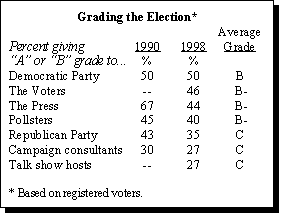Poorly Attended Election — Followed Closely
Although the elections did not produce the partisan upheaval seen four years ago, Americans paid just as close attention to news about the outcome of this year’s contests as they did to the results in 1994. Some 42% of Americans followed news stories about election results very closely this year, about the same as in 1994 (41%). Although news coverage of the 1998 elections focused largely on the unexpectedly strong showing by Democratic candidates, it was Republicans who paid the most attention to the election news — as they had in 1994. Nearly half of Republicans (48%) followed the results very closely this year, compared to 43% of Democrats and 37% of Independents.
Republicans also paid more attention to another major story that broke following the election — Newt Gingrich’s decision to step down as Speaker of the House of Representatives. Fully 42% of Republicans followed this story very closely, compared to 35% of Democrats and 30% of Independents. Another story coming out of this year’s election drew substantially less interest nationwide: Just 20% of Americans paid close attention to news about the election of former professional wrestler Jesse Ventura as governor of Minnesota.
Two other major stories captured the public’s attention in recent weeks. News about the devastation in Central America caused by Hurricane Mitch was followed very closely by more than one-third of Americans (36%) and was of more interest than any other major news story — including the elections — to Hispanics (39% followed very closely).
One-in-three Americans (34%) also paid very close attention to news about John Glenn’s flight on the space shuttle Discovery. Not surprisingly, the oldest man in space drew the most attention from fellow seniors. More than half of those 65 or older (52%) followed news about the trip very closely, compared to just 25% of those under 30.
Other stories in the news drew less interest. Just 18% of Americans paid very close attention to news about the recent Mideast peace agreement, while 16% very closely followed news about the murder of a New York doctor who performed abortions. Only 12% of the public followed news about the government’s trial against computer software giant Microsoft very closely.
Voters Got Information Amid the Mudslinging

Not only are voters mostly satisfied with the outcome of the 1998 elections, they are fairly positive about the process itself compared to 1994. Fully 59% say that they learned enough to make an informed choice on Election Day, up from 48% who felt that way in 1994.
However, when asked about particular aspects of the campaign, voters are much more critical. A 58% majority says that campaign commercials were not very useful in helping them choose a candidate. Two-thirds (68%) see the 1998 election season as more negative than previous elections and 61% say that there was less discussion of issues, compared to past elections.
Moreover, when asked to grade the various campaign players — the parties, the press and the pollsters, among others — voters are stingy with their praise. The Democratic Party earns the highest grade from the widest number: 50% of voters give it an “A” or a “B.” The Republican Party fares worse, with only 35% of voters grading the GOP a “B” or better. Both parties fare better among their own. Almost half of Republicans give the GOP at least a “B”; two-thirds of Democrats grade their party this well.
Voters are relatively more positive about their own role in the process: 17% give voters an “A” grade and almost half (46%) give them a “B” or better.

Voters remain only lukewarm in their evaluation of the news media: 11% give them an “A,” down substantially from the 22% who graded them this highly in 1990. An additional 33% give the press a “B,” which ranks the news media only slightly ahead of pollsters, who receive a “B” or better from 40% of voters.
Mixed Reviews for the Press
Voters relied equally on television news and newspapers for information about the elections in their state and district — 72% said they got most of their news from TV, and an equal proportion said most of their news came from newspapers. Among television viewers, local news was the mos t popular source. Fully 41% got most of their news from local TV, 21% from cable, and only 17% from the networks. Nearly one in four voters (23%) got most of their election news from the radio; 7% relied on magazines. This year 16% of voters turned to the Internet for news or information about the 1998 elections, up from 10% in 1996.
Voters overwhelmingly rate the news media as a more valuable source of campaign information than candidate commercials. By a margin of 60% to 29% voters say news reports rather than political ads gave them a better idea of where candidates stood on issues. Similarly, a majority of voters preferred news reports over commercials as a way of learning what the candidates were like personally (59% vs. 30%).
The number of voters who see the press as too influential in the outcome of elections is up significantly since 1990. Today, voters divide 46%-to-42% between those who say that the press had the right amount of influence on which candidates won elections in their state and those who say the press had too much influence. In 1990, only 31% of voters thought news organizations had too much influence; most (56%) thought the role of the media was about right.

